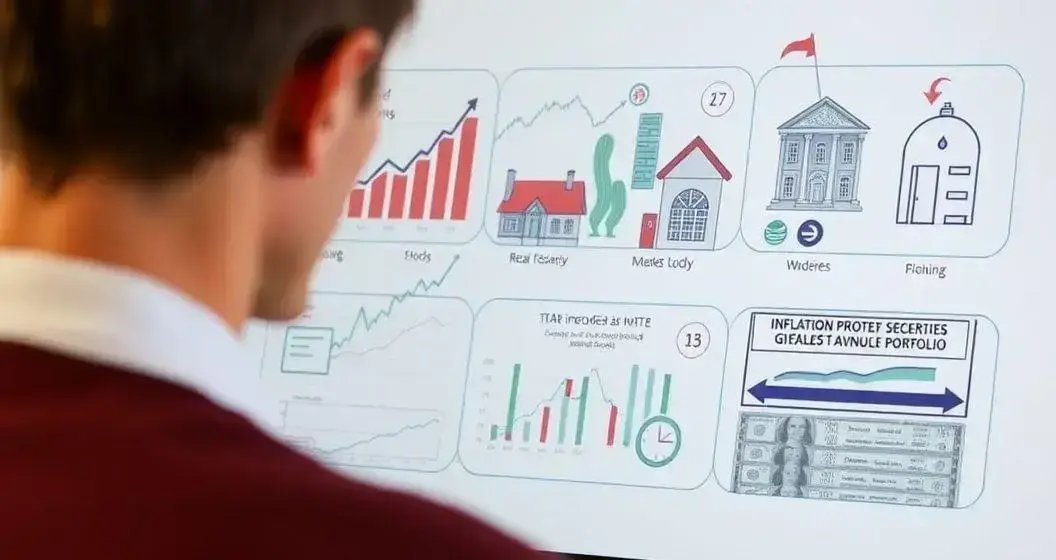Announcements
Inflation Impact on Savings significantly, eroding purchasing power and reducing the value of money over time. Understanding this phenomenon is essential for effective financial planning.
As prices rise, the returns on savings may not keep pace, making it challenging to preserve wealth. Many individuals overlook how inflation affects their savings strategies and long-term financial goals.
Keep reading to discover how to safeguard your savings and navigate the challenges posed by inflation.
Announcements
How Inflation Affects Savings Accounts
Inflation affects savings accounts by reducing the purchasing power of the money you save. When inflation rises, prices for goods and services increase, which means that your money buys less than it did before. For example, if the inflation rate is 3% and your savings account earns only 1%, you are actually losing money in terms of what that money can buy.
Many people believe that having money in a savings account is safe, but inflation can change that quickly. When the interest paid on savings accounts is lower than inflation, your savings lose value over time. This makes it essential to look for savings options that can at least keep up with inflation.
Announcements
Understanding the impact of inflation on savings accounts helps you make better financial choices. It encourages you to explore other investment options that can offer higher returns. By staying informed, you can protect your savings and ensure they maintain their value in an ever-changing economy.
The Relationship Between Inflation and Interest Rates
The relationship between inflation and interest rates is very important for saving money. When inflation rises, central banks often increase interest rates to help control prices. Higher interest rates can encourage people to save more money, as they earn more on their savings. However, this can also make borrowing money more expensive.
When interest rates are low, borrowing is cheaper, which can lead to more spending. This can boost the economy but may also increase inflation. If people spend more, prices may go up, leading to that same inflation cycle. Thus, the balance between inflation and interest rates is crucial for economic health.
Understanding this relationship helps people make better financial decisions. While high interest rates can protect savings from inflation, they can also slow down economic growth. It’s essential to be aware of these changes to navigate your savings effectively in an ever-changing financial landscape.
Strategies to Protect Savings from Inflation

To protect your savings from inflation, consider investing in assets that typically keep pace with rising prices. Stocks and real estate are common choices, as they often increase in value over time. These investments can help preserve the purchasing power of your money, ensuring that your savings don’t lose value due to inflation.
Another strategy is to explore inflation-protected securities, such as Treasury Inflation-Protected Securities (TIPS). These bonds are designed to adjust with inflation, so the amount you earn increases with rising prices. This can provide a safe way to earn interest while safeguarding your savings against inflation’s effects.
Diversifying your investment portfolio is also essential. By spreading your money across different types of assets, you reduce risk and increase the chance of higher returns. This can help you build a buffer against inflation, making it easier to maintain your savings’ value even when prices rise.
Inflation’s Impact on Investments
Inflation has a significant impact on investments, as it can change the value of money and returns. When inflation rises, the real value of your investment returns decreases. For example, if an investment earns a 5% return but inflation is at 3%, your actual gain is only 2%. This means that to truly grow your wealth, your investments need to outpace inflation.
The types of investments you choose can be affected by inflation as well. Stocks often perform better during inflationary periods because companies can raise prices to maintain profits. However, bonds can suffer since the fixed payments may not keep up with rising prices. Understanding these dynamics can help you make better choices for your investment strategy.
Additionally, inflation can influence how investors behave in the market. If they expect rising prices, they might shift their money into assets that historically perform well in inflation, like real estate or commodities. Being aware of these trends allows investors to adjust their portfolios for better protection against inflation’s effects and stay one step ahead.
Long-Term Effects of Inflation on Savings Growth
The long-term effects of inflation on savings growth can be quite concerning. Over time, even a small inflation rate can significantly reduce the value of savings. For instance, if inflation averages 3% per year, that money saved today will buy less in the future, lowering its true value.
This means that without higher interest rates, savings may grow slower than inflation, which can hinder financial goals such as buying a house or funding education.
Moreover, inflation can erode the growth of savings accounts and other low-yield investments. As prices rise, the purchasing power of the interest earned on savings declines. When the rate of return is lower than inflation, savers actually lose money in real terms over time. This is why it is essential for savers to consider investments that can outpace inflation.
Planning for the long term requires a focus on investments and strategies that can help maintain and grow savings. By choosing assets that historically outperform inflation, like stocks or real estate, individuals can help secure their financial future. Understanding these long-term effects can empower savers to make better financial choices today.
The Role of Inflation in Everyday Expenses
Inflation doesn’t just impact savings and investments; it also affects your daily expenses. As prices for groceries, gas, and utilities rise, the money you have saved stretches less than before. This makes budgeting more difficult and requires constant adjustments.
When the cost of essentials increases, families often have to cut back on non-essential spending. This can mean fewer vacations, reduced entertainment, or limiting dining out. Over time, these adjustments can change lifestyle habits and long-term financial planning.
Being aware of how inflation affects everyday costs helps individuals make smarter decisions. Monitoring price changes and adjusting budgets regularly can reduce the impact. Staying proactive ensures that you stay in control of your finances despite rising costs.
Inflation and Retirement Planning
Retirement planning is one of the areas most vulnerable to inflation. If savings don’t grow at a pace that matches rising prices, retirees may face financial difficulties. What seems like enough money today might not cover the same expenses years from now.
Pension plans and fixed incomes are particularly at risk because they may not adjust for inflation. This means retirees must carefully choose investment options that help maintain purchasing power. Relying solely on traditional savings accounts can be a dangerous approach in the long term.
To prepare for this challenge, individuals should consider inflation-protected investments and diversified portfolios. This strategy ensures that retirement savings remain strong. Planning ahead helps create financial stability even in the face of long-term inflationary pressures.
Global Factors Driving Inflation
Inflation is not just influenced by local policies but also by global economic factors. Supply chain disruptions, international conflicts, and energy price fluctuations all contribute to rising costs. These external pressures can affect national economies and personal savings alike.
For example, when global oil prices increase, transportation and production costs rise. This directly impacts the prices of goods and services worldwide. As a result, savers and investors must account for these international influences when managing their finances.
Keeping track of global trends helps individuals better understand the bigger picture of inflation. Staying informed allows for smarter investment decisions and more effective financial planning. Awareness of these factors ensures better protection for savings in an interconnected economy.






